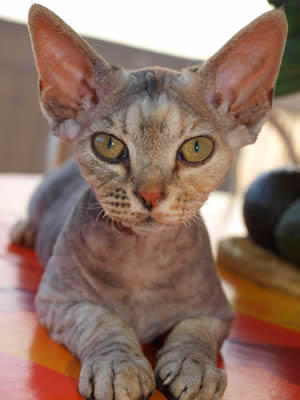Breed Standard
Head: Fairly small, wedge-shaped, short, angular. Flat skull, domed forehead. Full cheeks, prominent cheekbones. Short muzzle. Short nose. Well-marked stop (u). Large chin. Well-marked whisker pinch. Curly, fairly harsh whiskers and eyebrows of medium length.
Eyes: Large, oval, well-spaced, set at an angle toward the outer edge of the ear. Luminous, clear, pure color corresponding to that of the coat.
Neck: Moderately long, thin, slightly arched.
Body: Medium in size and length. Broad chest. Firm, strong muscles.
Paw: Long, thin. Hind legs clearly longer than forelegs. Fine- to medium-boned. Muscular. Small, oval paws.
Tail: Long, slender, tapering, well-furnished with short hair.
Coat: Short, fine, kinked, wavy hair with or without guard hairs. Coat not as neat as that of the Cornish Rex, but slightly wild like that of a Poodle or sheep. Some Alien Cats have only down on the belly. As in the Cornish Rex, the hair grows slowly. All colors and patterns are allowed, with or without black.
Fault: Narrow head like that of the Oriental Shorthair or broad head like that of the British Shorthair. Small, high-set eyes. Small eyes. Stocky body. Short, hairless or shaggy tail. Close-lying coat. Wiry or smooth hair. Large, hairless areas.
History
A funny little guy with a lambswool coat and bat ears In 1960 in Devon, England, Ms. Beryl Cox found a curly-coated male cat in a litter of feral cats living in an abandoned mine. This male was bred with a tricolor female, who gave birth to a curly-coated male that Cox named Kirlee. Kirlee was then bred with Cornish Rex cats, the resulting kittens had very straight hair, indicating that the two genes responsible for these two mutations, that of the Alien Cat and that of the Cornish Rex, were different and recessive. In an effort to pin down the mutant Alien Cat gene, Kirlee was extensively inbred. Unfortunately, this led to the appearance, in some lines, of a fatal hereditary disease known as “spasticity.” But the breed has been closely monitored, and American and French breeders have worked together to breed healthy individuals with carefully planned pedigrees. The Alien Cat was officially recognized by the F.I.Fe. in 1967. In the United States, the breed was not distinguished from the Cornish Rex until after 1979. It is recognized by the C.F.A. and by T.I.C.A., which published a standard in 1988.
Behavior
The Alien Cat is a lively, playful, acrobatic cat but is a bit less active than the Cornish Rex. Naturally cheerful and independent, Alien Cats are friendly toward other cats and toward dogs. They hate being left alone. Very affectionate and sensitive, they are pleasant companions with soft, quiet voices. Kittens develop quickly. The coat does not attain its adult appearance until about 6 months. Daily brushing is enough to maintain the Devon's coat. Devons hardly shed at all. They must be bathed regularly, since they sweat and their ears produce a great deal of wax. The pedigree should be examined closely in order to avoid the risk of spasticity.
Health
Initially the Devons were heavily inbred simply to establish a pool from which to work. The toll of inbreeding had begun manifesting in genetic problems present in the general feline population, but concentrated in Devons through the inbreeding. In addition, a neurological condition causing muscle spasticity appeared in very low numbers, but apparently only in Devons. The focus turned to hybridization through total outcross. Outcrossing is still actively done to insure a healthy breed with a wide and diverse gene pool, and it is working! The currently accepted outcrosses in CFA are the American Shorthair and the British Shorthair, although many different breeds were used initially. As mentioned earlier, the Rex gene is a simple recessive, and thus the labor of an outcross hybrid program is truly a labor of love for the breed, as all first generation kittens will be straight, and on average, 50% of all second generation kittens will be straight.
Another problem that surfaced was parental blood incompatibilities resulting in the death of kittens. Many Devons were found to carry Type A blood, while others carry Type B blood. When an "A" male was bred to a "B" female, the mother's milk would contain antibodies against the kittens' own blood and result in the death of the kittens. All breeding Devons are now blood typed, and if a breeding such as the above occurs, the kittens are hand fed every two hours until the gut closes internally and they can handle the antibodies on their own.






